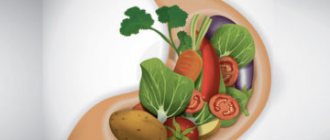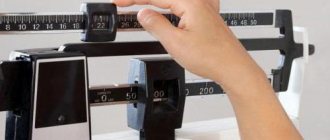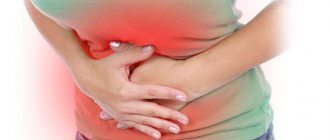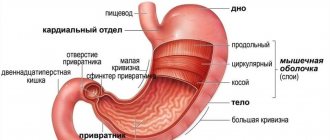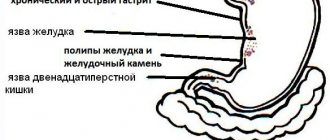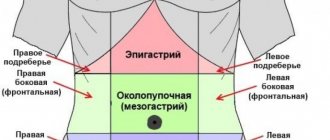One of the main problems considered by modern gastroenterology is dyspepsia. It develops when food is poorly digested in an adult or child, resulting in diarrhea, stagnation of feces or vomiting. Various reasons lead to the development of this disease. But most people, and according to medical statistics, up to 40% of residents of developed countries experience digestive discomfort, are in no hurry to consult a doctor.
Only every tenth patient comes for a consultation with a specialist. Others flippantly dismiss this problem. However, if food is not digested by an adult and is partially excreted along with feces, then it is urgent to find out the cause of this phenomenon. It can be not only a consequence of an error in diet, but also a symptom of a malignant neoplasm. That is why identifying the cause of pathology is sometimes not just getting rid of uncomfortable digestion, but an opportunity to save a person’s life.
Main stages of digestion
Food, as you know, enters our body through the mouth, where it is crushed. After this, the resulting mass moves through the esophagus into the stomach. Here all products become liquid and are broken down into fats, proteins and carbohydrates. Food is processed in the stomach in 15 minutes. up to 7-8 hours. The specific time depends on the type of food processing, their temperature, as well as the compatibility of various meal ingredients. Everything that remains undigested passes further into the duodenum.
At all stages of food passing through the gastrointestinal tract, it is affected by enzymes. These substances lead to the breakdown of proteins, fats and carbohydrates into individual components. As a result of this process, monosaccharides, amino acids and fatty acids arise. All of them enter the blood thanks to the work of the epithelium lining the walls of the small intestine. The “waste” remaining after this is sent further. Once in the large intestine, undigested food is exposed to microorganisms, which leads to the formation of waste and toxins.
Possible complications
Kidney problems can begin due to dehydration.
Delayed initiation or complete neglect of treatment leads to a significant deterioration in the patient’s condition. The nature of complications depends on the area of obstruction. As a result of stagnation in the pylorus, vomiting becomes a constant companion of the patient, which leads to a shift in the balance of electrolytes and dehydration. There is a possibility of vomit getting into the respiratory tract. Fluid deficiency negatively affects kidney function. Congenital gastric stasis is often complicated by aspiration pneumonia. If the lumen is blocked in the intestines, digestive juices can flow back into the stomach, damaging its walls and contributing to the formation of ulcers. Prolonged stagnation is dangerous due to rupture of the walls of the organ.
Classification
Why is food poorly digested in adults? The reason for this is the development of dyspepsia, which can be:
- Functional. This is an independent type of disease. It is caused by a functional indigestion.
- Organic. This type of dyspepsia is a concomitant symptom of other developing diseases. For example, there is indigestion of food due to poisoning, infections, cholecystitis, etc. In the organic form of pathology, structural changes occur in the cells and tissues of the gastrointestinal tract. If food is poorly digested in an adult, then the treatment of the pathology will depend on its type. That is why an accurate diagnosis is so important, which can only be done by visiting a specialist.
Forecast and preventive measures
With correct and timely therapy, the prognosis for recovery is positive. To extend periods of remission for a chronic disease, you must follow your doctor’s recommendations, follow your diet, undergo annual spa treatment, and drink mineral waters. You can avoid stagnation of food in the stomach if you adhere to the correct diet, control the quality of the foods you eat and do not violate your eating schedule. To strengthen the body's defenses, daily moderate physical activity and walks in the fresh air are useful. To prevent digestive disorders, it is advisable not to abuse alcoholic beverages and quit smoking.
Source
Classification of functional dyspepsia
The following nutritional types of pathology are distinguished:
- Putrid. With this type of dyspepsia, food is not digested in an adult due to the excessive inclusion of protein foods in the diet. This is especially true for those that can only be digested for a long time. The breakdown of proteins is accompanied by the release of toxic substances that poison the patient’s body. Such products are red meat (beef, pork, lamb) and its derivatives (sausage, etc.). Abuse of such food leads to the formation of putrefactive microflora in the intestines.
- Fatty or soapy. Why is food not digested in an adult with this type of dyspepsia? Eating too much refractory fat contributes to pathology. They are found in pork and lamb lard, as well as their derivatives.
- Fermentation. This type of pathology develops due to the predominance in the menu of dishes prepared from foods high in carbohydrates. Such food promotes the development of the fermentation process. An adult cannot digest food if he excessively consumes sweet and flour products, fruits and honey, cabbage and peas, legumes, mash and kvass, pickled vegetables, etc. In this case, fermentative microflora begins to develop in the intestines.
Causes of pathologies
Possible causes of indigestion (we have already discussed the signs above):
- Insufficient amount of gastric juice secretion, which can occur against the background of B vitamin deficiency, disorders associated with the evacuation of contents, or serious changes in the morphological nature of the gastric mucosa.
- Irregular eating.
- Incorrectly adjusted and balanced diet, for example, too often including in your diet foods that irritate the gastric mucosa; caffeinated drinks and sparkling water.
- A lifestyle that can hardly be called active, that is, a minimum of movements and a maximum of “sitting and lying down.”
- Drinking “hot” drinks.
- Consequences of surgery.
- Smoking.
- Depression and stressful situations.
- Lactose or gluten intolerance.
- Taking non-steroidal anti-inflammatory drugs.
- Increase in outside air temperature.
- Loss of central nervous system control over gastric acid secretion.
- Exercise immediately after a large meal.
- Functional digestive disorders can occur due to poorly chewed food. As a result, an insufficient amount of gastric juice is formed so that it can be absorbed by the body under the action of enzymes.
- Eating foods that cause increased gas formation.
Digestive disorders can occur due to the presence of the following serious pathologies:
- Inflammation of the pancreas, that is, pancreatitis.
- Stomach ulcers.
- Pathologies of the endocrine, nervous, excretory or respiratory systems.
- Esophageal dyskinesia.
- Cholecystitis.
- Gallbladder pathologies.
- Inflammatory processes in the small intestine.
- Giardiasis.
- Intestinal obstruction (ie, cystic fibrosis). The pathology is caused by the absence of a certain enzyme involved in the digestion process.
- Oncology of any digestive organ.
Important! All the reasons listed above are quite serious so as not to take them into account and self-medicate. The best way out in this situation would be to consult a specialist who will make an accurate diagnosis and prescribe the necessary treatment.
Classification of organic dyspepsia
If food is poorly digested in an adult, the following types of enzyme deficiency may be the causes of this condition:
- Pancreatogenic. This type of dyspepsia is caused by a lack of enzymes produced by the pancreas.
- Gastrogenic. This type of pathology is caused by disruptions in the secretory function performed by the stomach.
- Enterogenous. In this case, food is not completely digested in an adult due to a violation of the secretion of intestinal juice.
- Hepatogenic. This type of dyspepsia is of hepatic origin.
- Cholecystitogenic. Indigestion of food in this case is caused by impaired bile secretion.
- Mixed. This type of dyspepsia combines several organic types of pathology.
Why does it occur?
Stagnation in the stomach is not a disease itself, but a consequence of gastrointestinal diseases. Most often it is caused by a malignant tumor, especially in an advanced state. It grows, deforming the walls of the stomach and interfering with the passage of food throughout the digestive tract.
Another common cause is an ulcer located in the lower part of the stomach. This can cause pyloric stenosis, which is a narrowing of the outlet tract. Less probable, but still possible reasons for the stagnation of eaten food in the stomach include:
- stomach inflammation;
- infectious processes;
- formation of adhesions on the walls of the stomach;
- circulatory disorders in the body;
- gastric fistulas.
Provoking factors
Why can't an adult digest food?
At present, gastroenterologists have not yet identified specific causes for the development of “lazy stomach” syndrome. Nevertheless, it is known for certain that the development of pathology is facilitated by the influence of certain factors. Among them:
- overeating, poor nutrition, eating large amounts of excessively fatty foods;
- pathologies of the gastrointestinal tract that are chronic;
- frequent stress and psycho-emotional stress;
- maintaining a sedentary lifestyle;
- uncontrolled use of medications, especially hormonal agents and antibiotics;
- smoking;
- Helicobacter pylori infection;
- excessive coffee consumption;
- recent gastrointestinal infections (salmonellosis, giardiasis, etc.);
- poisoning of the body with chemicals;
- age-related changes;
- motility disorders of the duodenum and stomach.
Sometimes dyspepsia occurs due to dental ailments. They can provoke the entry of pathogenic bacteria into the gastrointestinal tract. Lazy stomach syndrome also occurs with alcohol abuse. Ethanol intoxication significantly impairs the functions of this organ. This is precisely the reason why people feel nauseous during a hangover. It is provoked by undigested food, which is pushed back.
Another possible cause of pathology is gastric atony. This condition leads to a decrease in the tone of its muscle layer. Due to this, food stops moving in the right direction. It accumulates in the stomach, beginning to put pressure on its walls. This process further reduces muscle tone. Atony often occurs in pregnant women.
Among the possible reasons that an adult cannot digest food may be the following:
- Poor formation of gastric secretions. This process is caused by hormonal changes or disruptions in the functioning of the secretory glands.
- Metabolism problems. Gastric obstruction sometimes occurs due to a slowdown in the release of enzymes that promote digestion. Such a process is evidence of enterogenous, hepatogenic, pancreatogenic or gastrogenic insufficiency.
- Accumulation of pathogenic microorganisms on the gastric mucosa. Such bacteria significantly aggravate the manifestations of pathology.
It is worth noting that when you go to a doctor with a complaint that an adult cannot digest food, the causes of functional dyspepsia in 30-35% of cases cannot be identified.
Why does the stomach not digest food?
Common reasons for problems with digestion of food are:
- slow metabolism;
- insufficient amount of enzymes involved in the breakdown of substances;
- the presence of diseases associated with the gastrointestinal tract;
- harmful bacteria are present on the mucous membranes of the stomach and intestines;
- pregnancy;
- alcohol abuse;
- improper and unbalanced diet;
- non-compliance with daily routine and meals.
Manifestation of the syndrome
How can you tell if an adult is unable to digest food? Treatment of dyspepsia should be started immediately after the first symptoms appear, which are:
- pain in the epigastric region, which most often occurs at night;
- increased bloating of the intestines and stomach;
- the presence of a feeling of satiety, despite a long break in eating;
- indigestion, expressed by nausea, heartburn and vomiting.
Symptoms of dyspepsia, depending on its type, may have some differences. Let's take a closer look at them.
Symptoms of pathologies
Manifestations of disturbances in the functioning of the digestive system may be as follows:
- decreased appetite;
- feeling of heaviness in the abdomen;
- a nauseating state, sometimes turning into vomiting;
- chronic diarrhea or constipation;
- bloating;
- presence of edema;
- deterioration of the blood clotting process;
- aching or colicky pain syndrome;
- constant headaches;
- sudden irritability;
- belching;
- emotional imbalance;
- presence of pain in the heart area;
- night blindness (characterized by the inability to see anything in the dark);
- heartburn;
- pallor of the skin.
On a note! If the presence of diarrhea is a consequence of metabolic disorders, then anemia may occur, which is characterized by a lack of iron in the body.
Symptoms of acute indigestion (in addition to those already listed above):
- certain difficulties in bowel movements;
- belching air;
- bad breath;
- sharp pain in the stomach;
- apathy;
- a feeling of rapid satiety (regardless of how much was eaten);
- weakness;
- discomfort felt in the hypochondrium area;
- an unpleasant feeling of heaviness in the intestinal area;
- burning in the chest.
Signs of the fatty form of pathology
With this type of dyspepsia, patients complain of rumbling in the stomach, diarrhea, bloating and general weakness. In this case, the stool is liquid and frequent, light-colored, with a predominance of either neutral or alkaline reaction.
When conducting a microscopic examination of feces, significant accumulations of crystals of fatty soaps and fatty acids are observed.
Why may digestion be disrupted?
All stages of digestion are closely related to each other. Thus, the body prepares for digestion as soon as it sees appetizing food or recognizes a pleasant aroma. The brain sends an impulse and saliva begins to be produced. Food enters the oral cavity, and as soon as we begin to chew, the stomach begins to reflexively produce gastric juice. Food enters the stomach, and the pancreas and liver are already in full swing preparing the necessary enzymes for high-quality digestion of what is eaten. Next, the intestines come into play. The efficiency of food digestion also depends on how well peristalsis works and how actively intestinal juice is secreted.
If digestion is disrupted at least at one stage, the result cannot be good. If the food eaten is poorly chewed, the stomach will not be able to cope with the digestion and breakdown of components. If the stomach has not been completed, the intestines will not be able to absorb all the necessary substances; if the small intestine has not taken everything it needs, then the processes of rotting and decomposition will disrupt the absorption of water and the formation of feces.
Elimination of functional dyspepsia
If, for one reason or another, food is poorly digested in an adult, treatment must certainly be comprehensive. In addition to the use of medications, the patient is recommended to take measures to normalize the character and diet, as well as lifestyle.
The course of treatment for functional dyspepsia consists of eliminating fatty, spicy and salty foods from the menu. The patient should eat up to eight times a day and in small portions. If necessary, additionally prescribed:
- antacids (Almagel, Gaviscon);
- proton pump inhibitors (Rabeprazole, Omeprazole);
- sedatives (Grandaxin, Phenazepam).
In the case of fermentative dyspepsia, the course of treatment begins with a diet that is low in carbohydrate foods. It is allowed to include high-protein dishes (meat broth, steamed chicken, butter) in the menu while simultaneously reducing the amount of cereals, baked goods, fruits, vegetables, potatoes and bread. Adsorbent substances (Polysorb, Smecta), probiotics (Bifikol, Laktrofiltrum), as well as enzyme agents (Pancreatin, Creon) are used to eliminate fermentative dyspepsia. Gradually, as the patient recovers, carbohydrate-containing foods are introduced into his diet in limited quantities.
Therapy for putrefactive dyspepsia is carried out similarly to that used for the fermentative form. First of all, foods high in protein are excluded from the diet. At the same time, probiotics and sorbents are used. The need to take antibiotics is determined by your doctor.
Treatment of fatty dyspepsia is carried out by limiting the inclusion of fats in food. The main dishes for the patient should be low-fat cottage cheese and lean meat, boiled fish, etc. Carbohydrate consumption should also be moderate. Drug treatment consists of prescribing calcium carbonate, gastroprotectors and vitamins, including ascorbic and nicotinic acid.
How to normalize the condition?
What to do if the stomach does not accept food, if vomiting and other symptoms appear? Don't panic, this condition is treatable, which includes:
- drug therapy;
- diet therapy;
- natural traditional medicine;
- physical therapy.
Drug treatment
Medicines in each individual case are selected individually, depending on the cause of dyspepsia and its nature, they include the following groups:
Agents affecting secretion
To reduce secretion, antacids are used ( Almagel
,
Maalox
,
Gastal
,
Gaviscon
,
Rennie
), proton pump blockers (
Ortanol
,
Omez
,
Omeprazole
).
For secretory insufficiency, Acipepsol
,
Plantaglucid
,
Pentagastrin
,
Betacid
and analogues are prescribed.
Gastroprotectors
Drugs that provide mechanical protection to the mucous membrane include: bismuth derivatives (Venter, bismuth nitrate, Vikalin, Vicair), mucus production stimulants (misoprostol, enprostil).
Drugs affecting motor skills
To relieve spasms, No-shpa
,
Drotaverine
.
Prokinetics enhance motor skills - Motilium
,
Cisapride
,
Domperidone
. The choice of drugs is made by the doctor, who determines the dose and method of administration.
Antibacterial agents
For infectious diseases of the stomach, putrefactive processes, and detection of Helicobacter, antibiotics are used - clarithromycin, amoxicillin, tetracycline in combination with metronidazole.
Vitamin preparations
Among the many vitamin and mineral complexes for the stomach, Bion-3, Milgamma, Vitrum, Supradin, Multitabs are more suitable; they contain vitamins A, C, E, B12, folic acid, biotin, and microelements.
Diet food
Without normalizing your diet and diet, you cannot expect that even the most “magic” pills will help. It is necessary to review your menu, give up addictions to unwanted foods and give preference to healthy ones.
In the acute stage of the pathology, especially during a putrefactive process, fasting is possible, but not more than a day, and it is necessary to drink plenty of liquid - preferably drinking and low-mineralized water without gas.
The diet should include dishes with well-processed and easily digestible foods: lean boiled meat, stewed vegetables, fruit purees and juices, dairy products. It is necessary to exclude spicy, smoked, fried foods, animal fats from the diet, and limit the intake of carbohydrates (flour, sweets).
The diet is very important; the daily diet should be divided into 5-6 meals so as not to overload the stomach. Your doctor will give you specific dietary recommendations, and they must be followed.
Elimination of organic dyspepsia
When you consult a doctor who will make an accurate diagnosis, you will be able to understand why food is poorly digested in an adult. Treatment of the causes of organic dyspepsia involves treatment of the underlying disease. Depending on the type of pathology, medical tactics will also be specified. For example, if the cause of the “lazy stomach” syndrome is a peptic ulcer or gastritis, then the patient is recommended to:
- Diet. Her menu excludes spicy, salty and fatty dishes. Foods rich in fiber should also be excluded from the daily diet, namely fruits, rye bread, juices, vegetables, etc. It is worth keeping in mind that they all contribute to increased pain.
- If Helicobacter pylori infection is detected, complex antimicrobial therapy is prescribed. It must include two types of antibiotics.
- To normalize acidity, lower it with drugs included in the group of proton pump inhibitors, or increase it by stimulating acid-forming cells with Plantaglucide. In the latter case, you can also use plantain juice.
- Taking medications that help create a protective lining for the gastric mucosa (De-Nola, Sucralfate, etc.)
If an open ulcer is detected, surgery is performed. An indication for it is the resulting neoplasm.
If the “lazy stomach” syndrome is caused by hormonal imbalance, then treatment is prescribed by an endocrinologist.
Causes of congestion in the stomach
Retention of food without further passage through the digestive tract is an alarming symptom of serious diseases, including a malignant tumor. Gradually growing, the neoplasm destroys the gastric walls and forms a barrier to the natural movement of food bolus. Stomach ulcers, especially the section connecting it to the duodenum, also interfere with the consistent process of digestion. The pylorus narrows and undigested food stagnates in the stomach. The causes of the pathology may be:
- circulatory failure in the tissues of the stomach;
- diverticula;
- adhesions;
- fistulas;
- infectious or inflammatory diseases of the gastrointestinal tract;
- intussusception;
- swallowed foreign bodies;
- atony of the stomach muscles;
- congenital absence of intestinal lumen.
Return to contents
How does food stagnation manifest?
At the first stages of the development of gastric stasis, the signs are weak and can only appear when eating coarse, hard, difficult-to-digest food, but over time the stomach begins to reject even soft and liquid food. Vomiting is noted as the main and most pronounced symptom of the pathology. The masses have a fetid, rotten smell; parts of unprocessed food, mucus and blood streaks are found in the contents. Additional symptoms of gastric obstruction:
- feeling of being full from a small amount of food;
- belching with a rotten smell;
- heaviness in the epigastric area;
- sudden weight loss.
If stagnation of food in the stomach cavity is accompanied by pain, there is a possibility of developing a cancerous tumor or ulcer on the walls of the organ.
What will help with poor digestion?
If you suffer from increased gas formation due to poor digestion of food, you need to help your body adjust to the correct mode. Try to follow a daily routine and eat on time with an interval of no more than 4 hours. Naturally, you shouldn’t overeat at night.
If you suffer from heartburn due to increased production of hydrochloric acid, include bitter foods
- they will stimulate the secretion of bile and remove excess acid from the body.
If you constantly feel heaviness in your stomach after eating, give preference to hot dishes, as they relieve the feeling of heaviness and help get rid of excess mucus in the stomach.
If indigestion symptoms get worse at night, placing an extra pillow under your head will help. Elevating your upper body helps prevent stomach acid from entering the upper esophagus.
Keep a “food diary” in which you track the foods that make you feel bad after eating. Avoid using them.
Diagnosis of gastrointestinal diseases
Diagnosis of pathologies of the digestive system is based on clinical data and additional studies. First of all, patients must undergo a general blood and urine test. If inflammatory diseases of the abdominal organs are suspected, it is necessary to determine the level of indicators such as bilirubin, ALT and AST, and amylase. You should also have your stool tested.
Instrumental studies include radiography, ultrasound of the abdominal cavity and FGDS. In some cases, additional diagnostics are required.
Diagnostics and therapeutic therapy
When the stomach is unable to digest the food that comes into it, it is important to seek medical help in a timely manner. The doctor will be able to diagnose the condition and confirm the presence or absence of pathology. Diagnostic methods include tomography, ultrasound, laboratory blood and stool tests.
If the cause of a lazy stomach is gastritis, an ulcer or another ailment, it is necessary to treat the disease that provokes the clinical picture. If the process of digesting food is difficult, medications are prescribed to stimulate gastric motility. Gastroenterologists usually prescribe the following drug therapy:
- enzymes – necessary to improve the functioning of the gastrointestinal tract (Mezim, Gastenorm Forte, Creon and Pancreatin);
- antihistamines – reduce high acidity of gastric juice (Ranitidine, Clemaxin);
- painkillers - help relieve pain, improve stomach activity (Spazmalgon, Drotaverine).
If a child needs treatment, the pediatrician prescribes gentler medications. For elderly people, cleansing enemas are used. This approach to treatment is due to the fact that with age, metabolism noticeably worsens and slows down, internal organs become worn out. Such circumstances provoke cramps and pain in the abdomen, constipation, as the intestines become clogged over the years. To avoid disruptions in the digestive process, it is recommended to do an enema once a week for elderly people. Before performing the manipulation, you should drink a glass of wormwood decoction, which has a positive effect on the digestive process and metabolism. It is necessary to consult a doctor in a timely manner and begin treatment. In most cases, following a diet is sufficient to normalize the functioning of the gastrointestinal tract. A drug course of therapy is prescribed by a gastroenterologist. It is not recommended to select medications on your own.
Digestion and metabolism depend on the quality of digestion. They often talk about the problem of excess weight, which arises due to impaired metabolism, but the lack of weight due to impaired absorption of nutrients from food is extremely rarely remembered. How to improve digestion so that absorption increases without taking medications?
1. Chew your food thoroughly. It only seems to us that we have no problems with this, but once you pay attention to this, you will realize that you are swallowing literally half-chewed pieces. To chew more thoroughly, you need to take very small portions on a spoon, on the edge. Otherwise, it will be difficult to chew a larger amount of food properly, and it will take a lot of time; your jaws will get tired from unaccustomed use. Ideally, after chewing, food should take the form of saliva and only then be swallowed. This will speed up digestion and increase absorption. In addition, a smaller portion, but chewed more thoroughly, fills you up faster and more than a larger portion, but swallowed in a couple of minutes. Remember: everything that is not chewed will not be digested!
Conclusion: the less food you take per spoon at a time and the longer you chew, the better. It’s not for nothing that a whole hour is allocated for lunch!
2. Drink water throughout the day, especially in the morning, and also before meals (half an hour to an hour before). This will gradually improve digestion. It is not recommended to drink water during meals, because... it reduces the effect of gastric juice. If during a meal or immediately after you are very thirsty, this is a signal that the food is chewed poorly (see point 1) and the gastric juice “does not have enough strength” to cope with such pieces. If you “want to help,” it is better not to “make it easier” for the gastric juice to work with water, but to chew the food thoroughly. Instead of water during meals, you can drink tea, juice, milk, etc.
3. Add “digestibility stimulants” to your diet. These are flax seeds, garlic. They will help you “take away” the maximum amount of nutrients from food. Grated or ground ginger can be added in small quantities to any dish or brewed into ginger tea. The same can be done with flax seeds, in addition, you can simply eat them, for example, one teaspoon per day.
4. Do not eat cold or, conversely, too hot food.
5. Eat fiber. These are dietary fibers that improve the absorption of nutrients in the intestines. They are not absorbed in the stomach, but are processed in the intestinal microflora. It is better to give preference to soluble dietary fiber. Fiber is contained in bran, cereals, rye and grain bread, dried fruits, nuts and the already mentioned flax seeds. But you shouldn’t get carried away and eat all of the above at once: dietary fiber should be consumed in moderation; an excess of it can already have negative consequences.
6. Try to eat foods that are easier to digest. These are foods that contain more carbohydrates than proteins and fats. “Heavy” foods, such as fatty, heavily fried foods and meat, even in a healthy body take a very long time to digest, and if you have digestive disorders, eating such food will only aggravate the situation.
7. Use choleretic. The bile-forming function of the stomach serves to increase the absorption of substances. For these purposes, they use, for example, olive, cedar and linseed oils.
8. Medicinal herbs. Look in your home medicine cabinet. Most likely, there will be a long-forgotten package of chamomile, rose hips or calendula. Brew herbs as usual and supplement your diet with them.
9. Visit your doctor. A gastroenterologist - a digestive specialist - is the doctor whose visit it is better not to postpone if you notice problems with digestion and absorption of nutrients.
Poor digestion can include heartburn, increased acidity, and general discomfort after eating. What can cause poor digestion?
Poor digestion occurs due to the fact that the body is not able to properly process all the incoming food.
Symptoms of indigestion can be very diverse: heartburn, bloating, nausea, increased gas, diarrhea.
Herbs for poor digestion
There are a variety of herbs for indigestion. To improve digestion, bitter herbs are very helpful: infusion of artichoke leaves, dandelions, orange peels, angelica. The bitterness in such herbal teas increases the secretion of bile, and food in the stomach breaks down faster.
Chinese hawthorn infusion prevents stagnation of food mass in the intestines.
Before eating, drink a glass of warm water with a slice of lemon - this will help properly adjust your stomach for food intake and get rid of excess mucus.
Eat enough vegetables and grains - they contain fiber, which binds and removes harmful substances and excess bile. The minimum amount of fiber is 30 grams per day.
In general, the best way to get rid of poor digestion is to conduct a general diagnosis of the gastrointestinal tract. Gastroscopy will help determine the condition of the esophageal muscles and the level of acidity. The results of the examination will help you choose the right strategy to combat indigestion and poor digestion.
